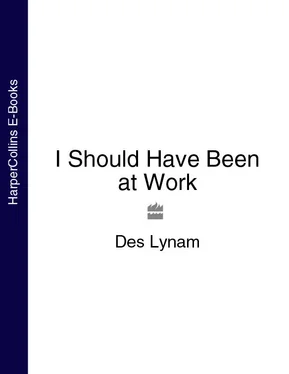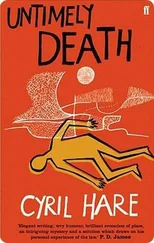My maternal grandmother Hannah, known as Annie, was a beauty when young and in later life devoted herself to the family and to the Roman Catholic Church. She rose early to go to Mass every day of the week. Packo went to church on Sundays, but each night of his life he could be seen kneeling on a chair in the living room of the tiny house in which he brought up his large family to say his prayers – his ‘duty’, he called it. They had absolute faith in the Catholic Church and their God and gave enormous respect to the local clergy, several of whom, including the bishop, became Packo’s close friends on his weekend hunting or fishing expeditions.
The house did not boast a bathroom: a tin bath was kept for the purpose of the occasional full-body ablution, with the water boiled in large kettles on the turf-fired ‘range’. The toilet was outside in the back yard. There was no refrigerator, food was bought fresh each day, and of course there was no telephone. My grandfather conducted his business by ‘message’. People would arrive at the door, to book their horse in for a ‘shoeing’, or simply turn up, in hope, at the forge that was a short walk from the house.
My grandfather was a farrier, a blacksmith, with his own business, like his father and grandfather before him. In the Forties and Fifties, the west of Ireland had not changed much since the turn of the century, and people continued to be largely dependent on the horse for transport. Deliveries were made by horse and cart; the pony and trap was still used by many for their personal journeys and donkey carts were prevalent too. Business was brisk for my grandfather, and only the hours in the day limited the amount of work available.
The story goes that Packo and his father had decided not to get involved in those newfangled motor cars, probably thinking them a passing fancy. Henry Ford’s Irish grandfather, a farrier from County Cork, had made a different decision, and the family had done rather well as a result.
My Uncle Frank, a dab hand with car mechanics, had been persuaded to assist his father as a farrier and eventually took the business over; but of course he saw its decline into a virtual tourists’ showpiece as the motor car began to dominate our lives.
My earliest years were spent in a home full of warmth, fun and security. The house was in the town centre, opposite the Friary Church, handy for my grandmother. There were always visitors – aunts, uncles, cousins, neighbours – calling. Sometimes, on a Sunday, we would take the pony and trap out to visit a relative’s farm a few miles from town. I can still hear the clip-clop of the little animal’s hooves and smell the leather upholstery of the highly polished trap. One of my earliest memories is of being allowed to hold the reins of the pony.
I was too young to be aware of the horrors happening all over Europe – the bombing, the Holocaust, the terrible suffering. Ireland was a haven of tranquillity, having declared its neutrality under President de Valera.
My mother kept mentioning this fantasy figure called ‘Daddy’. I could not quite imagine who or what he was. This mysterious person had actually written to me from India, telling me to be a good boy and look after Mummy while he was away. This letter was read to me, as I was only three years old. I can imagine it not meaning too much to me.
Then, one day, a good-looking man in a grey pin-striped suit and a trilby hat arrived at the door, picked me up in his arms, and kissed me on the cheek. This was an invasion of privacy – and he was paying a rather undue amount of attention to my mother as well. I cried my eyes out.
Eventually, I must have warmed to this intruder; but, not so long after, there was another interloper, and I was no longer the focal point of everyone’s attention. My sister Ann was born. Of course, she had been delivered by an angel to my mother in hospital, a story I must have bought without further question. All I knew was that this new person was taking up a vast amount of my mother’s time and interest, and for the first time in my young life I felt the pangs of jealousy. My grandmother had to take me to one side and explain that Mummy certainly loved me the best but, because Ann was so small, she needed to be specially looked after.
But the ‘looking after’ wasn’t enough to save her young life. Within six or seven weeks of her birth, she died of meningitis.
While I remember my baby sister arriving, I have no clear memory of her death or that it affected me very much at the time. I suppose I was shielded from it, and my grandparents would have explained it all as ‘the will of God’. I have often wondered what sort of person Ann would have grown into and what effect she would have had on my life.
Obviously my mother and father were distraught at the loss. Soon afterwards they decided to take up their jobs in England again, and I found myself on the train to Limerick and Dublin and then the mail boat crossing from Dun Laoghaire to Holyhead in North Wales, a journey I was to experience almost every year during my childhood as we went ‘home’ for the summer holidays.
My parents had rented a flat in Brighton before the war but now needed a new home. At first we became lodgers in the house of one of Dad’s work colleagues, who had two sons, both older than me. I didn’t take to them, and the feeling was entirely mutual. They continually mocked me when I spoke. I could not understand why, but of course I had a broad County Clare accent and they couldn’t make out a word I said, and neither could their parents.
Pretty soon we moved to a brand new council house, the building of which was virtually going on around us. Amongst the labourers were German prisoners of war, yet to be repatriated. I learned, much later, that they were treated badly by some of our new neighbours, but my Dad showed them respect. His view was that they were probably family men like him whose lives, like his, had been disrupted for five years through no fault of their own. Soon they disappeared back to their homeland, and I was disappearing off to school.
St John the Baptist Roman Catholic Primary School was a pretty dismal-looking place in a poor part of the town run by a combination of nuns and lay teachers. Most of the kids were from Irish or Italian Catholic families, but I was the only one nobody could understand, for a while at least. My earliest memory of school is of being asked to draw a line. I drew a funny little animal with four legs. For me a line, with my Irish accent, was a tiger without the stripes. The teacher thought I was mucking about. My parents told me that within a few months, the Irish accent had disappeared and I became like the other kids in my speech patterns, unlike my parents, who retained their Irish accents all their lives.
Once I could make myself understood I became accepted by my infant peers and I began to enjoy going to school. I worked out pretty soon too that I wasn’t the dullest in the class by a long way. Within a year, though, I was to be out of school for nearly three months. I had been complaining of stomach ache and a local doctor had diagnosed indigestion, told my mother not to let me eat apples, prescribed some milk of magnesia, and said I would be alright in a day or two. Over the next few days, I gave them great cause for worry. I developed spots, which my father immediately knew was measles, and the stomach pains were getting worse. Dad telephoned another doctor, Dr John O’Hara, who saved my life and whom I met again thirty years later when he was on the council of the Football Association. Dr John immediately diagnosed a septic appendix: I was in a fever with the measles, and now needed an urgent operation as well. My parents, having lost Ann a short time before, were now close to losing me. The appendix was taken out – probably in a hurry. The scar is still prominent all these years later. After the operation, I was removed to an isolation hospital, where I would remain for some weeks. When I eventually returned home, I must have looked a very poor specimen indeed. I could scarcely walk, having been bedridden for so long, and for weeks my mother had to take me to a clinic for physiotherapy to help me get the use of my legs again.
Читать дальше












